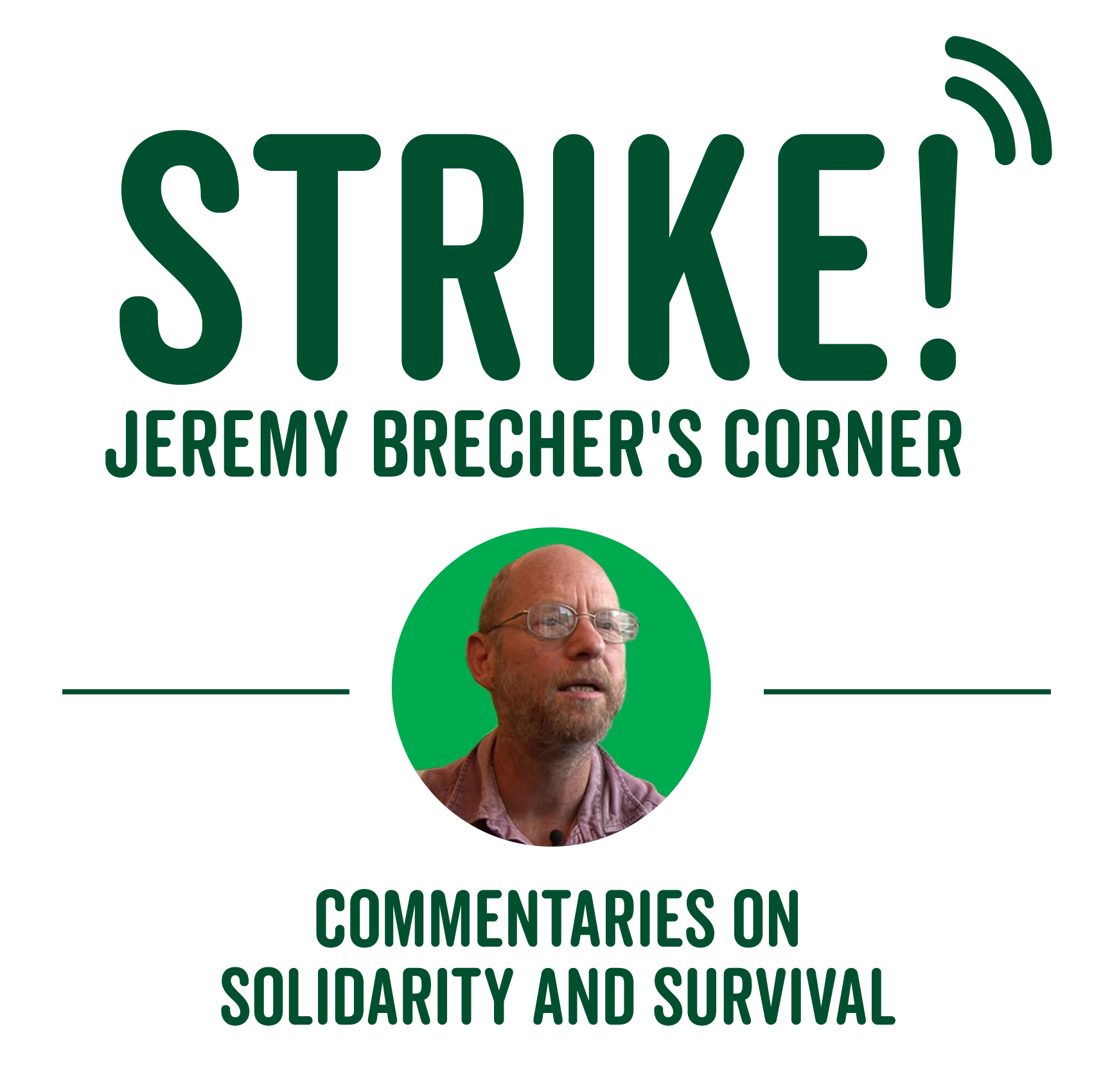As the world’s governments escalate the threat of human annihilation through climate change, nuclear holocaust, and burgeoning injustice, it is hard to see what alternative world order could restrain their depredations – let alone how such a world order could be achieved. Richard Falk is one of the few thinkers who has addressed those questions both in his writings and in his life. In this commentary I tell the story of his impact on me over the past half century to suggest what we all can learn from him.
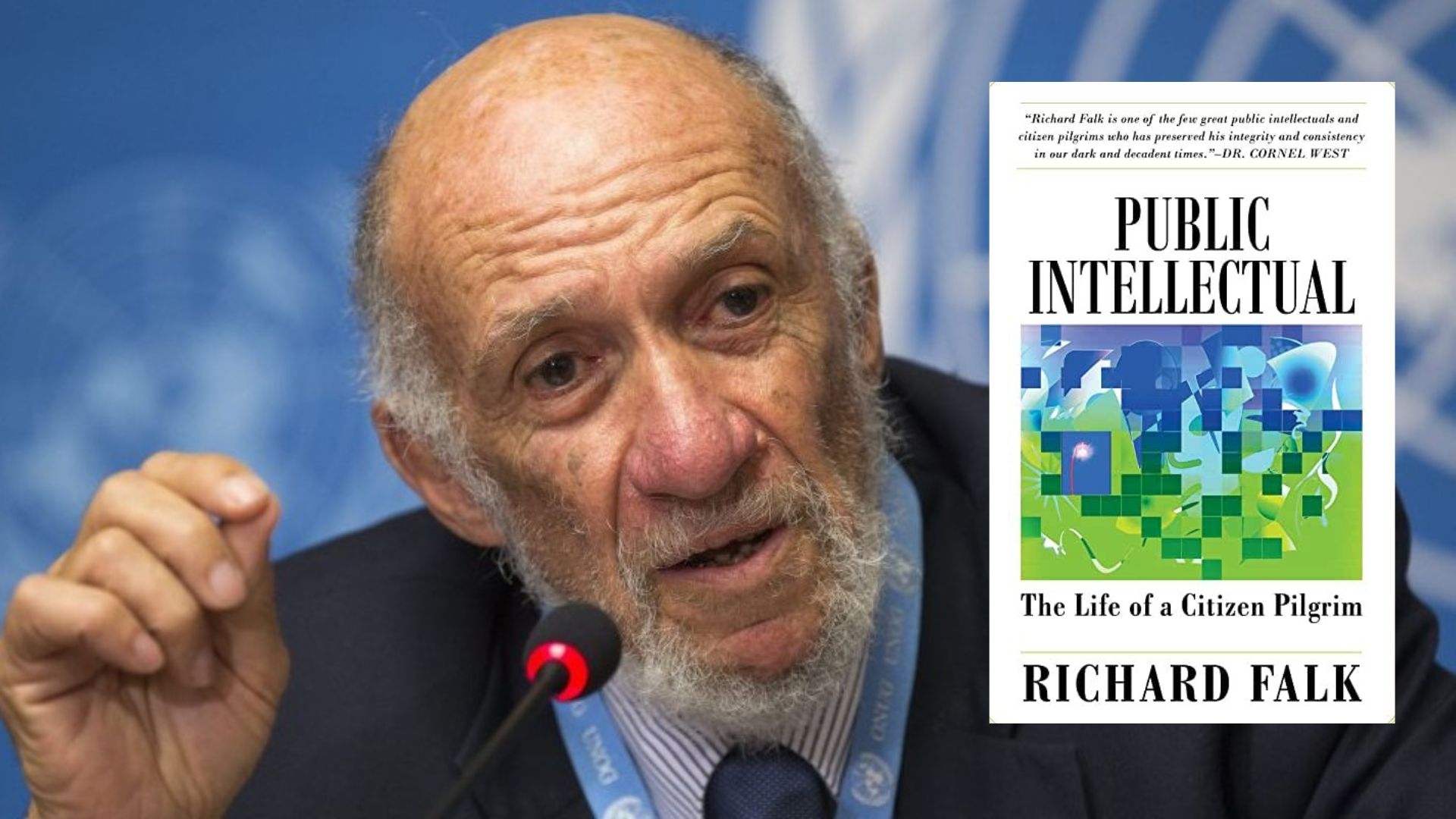
Richard Falk, 8 September 2014. Photo: Iran Review, www.pressenza.com, wikimedia Commons
Although I have met him only once, I’ve spent a lot of time over the past fifty years learning from Richard Falk. Now in his 90’s, Falk has recently published a memoir called Public Intellectual: The Life of a Citizen Pilgrim that helps me understand why.[1]
Falk is the Albert G. Milbank Professor Emeritus of International Law and Practice at Princeton, but he has eschewed the dominant “realist” approach to international law that portrays existing states as the only significant actors, instead promoting an alternative vision in which social movements around the world contest the existing world order. While he is perhaps best known for his highly controversial role as UN Special Rapporteur on “the situation of human rights in the Palestinian territories occupied since 1967,” in which he stated that Israel’s 2009 offensive in Gaza was a war crime of the “greatest magnitude,”[2] he has been a prolific writer and speaker on subjects ranging from the Vietnam War to human rights to the environmental crisis.
I first became aware of Falk in the midst of the Vietnam War. One day, as the US war escalated, Marcus Raskin, co-director of the Institute for Policy Studies, mentioned the Manifesto of 121 that had encouraged resistance to the French war in Algeria and wondered how we could get a copy.[3] I was a young student at IPS, and I recalled that an old copy of the British New Left Review had a translation of the statement. Next time I visited my home I found it and gave it to Marc.
The Manifesto of 121 likened French torture in Algeria to Nazi atrocities, therefore justifying extralegal resistance to the war. It pledged to support soldiers who resisted the war and those who aided them, even though such resistance was a serious crime.
As the US escalated its war in Vietnam, young Americans started a draft resistance movement, burning draft cards, fleeing the country, and risking imprisonment for refusing to fight in Vietnam. They found support in a small number of religious and intellectual figures who issued a Call to Resist Illegitimate Authority.[4] As the Manifesto of 121 justified resistance to French atrocities in Algeria by comparing them to Nazi torture, the Call compared US atrocities in Vietnam to those for which Nazi leaders had been tried as war criminals after World War II – and justified resistance to the war as a right and even a duty.
This “extremist” charge received support from an unexpected quarter: Professor Richard Falk, who spoke and wrote extensively about the parallel. He co-edited the book Crimes of War[5] and advocated a “Nuremburg obligation” that made it a duty not to participate in war crimes, even if given orders to do so by those claiming governmental authority. He testified for the defense in numerous anti-war civil disobedience trials, notably those of the Catholic activists Philip and Daniel Berrigan.
World Orders
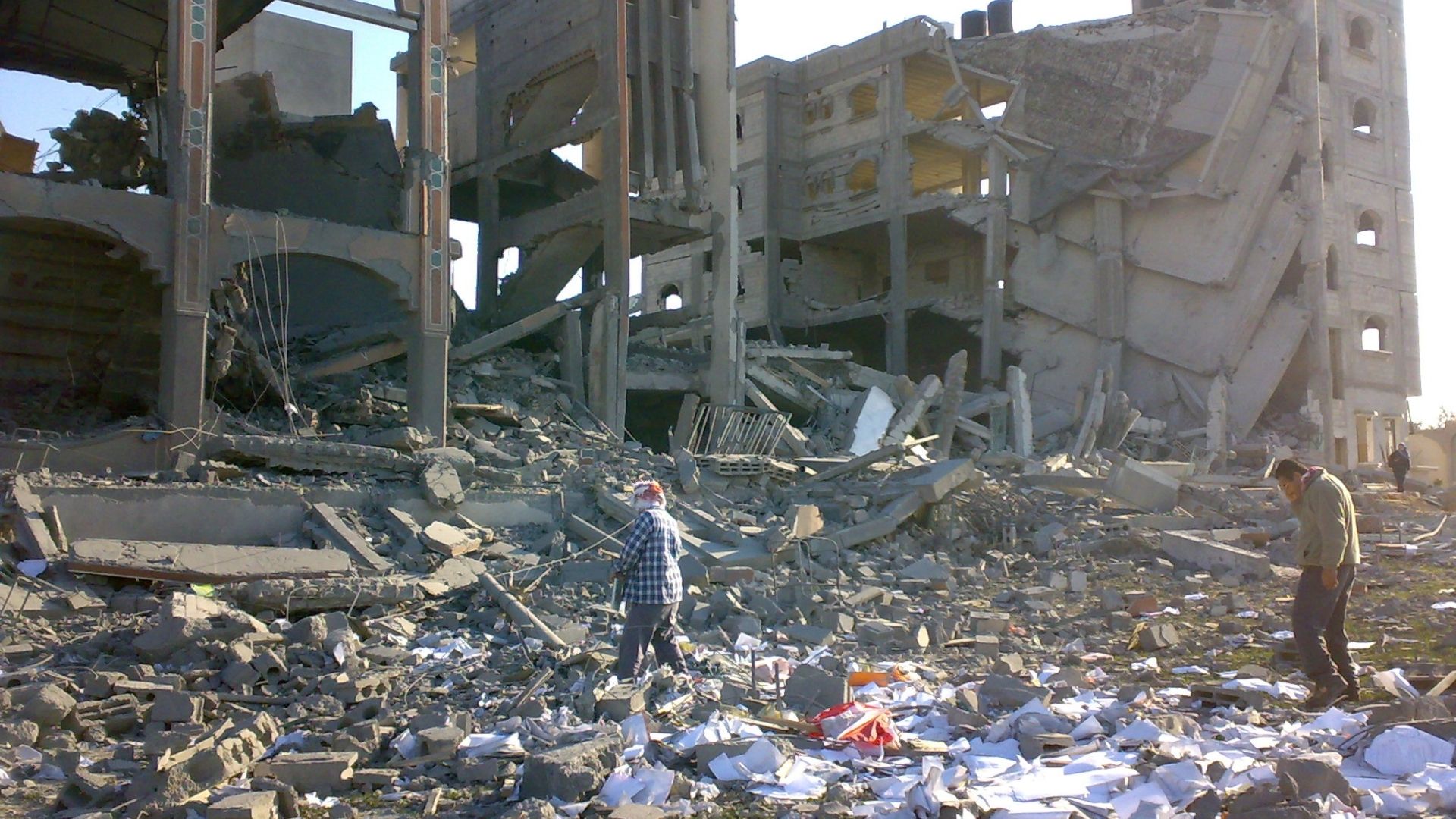
Destroyed building in Rafah, 12 January 2009. Dar al-Fadila Association for Orphans, consisting of a school, computer center and mosque in Rafah serving 500 children, were destroyed by the Israelis during Israel’s assault on Gaza. Photo: International Solidarity Movement, Wikimedia Commons
As injustice, poverty, war, and environmental catastrophe became ever more threatening, I came increasingly to regard the nation state system as a barrier to solving them. And yet identifying an alternative presented a dilemma. On the one hand, there was clearly an urgent need to constrain nation states through some kind of global authority. But on the other hand, power and wealth were already too centralized in states and national corporations allied with them. World government would only aggravate an already overcentralized distribution of power.
As I struggled with this dilemma, I came across a book by Richard Falk called The Promise of World Order that took this dilemma head-on.[6] It pointed out that the existing world order, with its nation state system based on a war of all against all and domination by the most powerful, was heading to ecological, military, and moral catastrophe. But simply producing a world state modeled on existing nation states would only increase the centralization of power without moving it to a more humane, peaceful, and sustainable basis.
In this and other work, Falk proposed instead a process that would redistribute power both upward and downward. The downward redistribution would redefine the relation between states and people, with much more governance and security controlled by local, small-scale communities. The upward redistribution would create institutions for addressing state-transcending problems – that is, problems that can only be solved on a global scale, such as protecting the ecosphere, eliminating weapons of mass destruction, and redistributing world resources.
Such institutions would require significant powers, but need not resemble territorial states.[7] The power to make war on other nations and to destroy the earth’s environment had to be limited by a form of supranational governance if the human species was to survive, but that did not mean an all-powerful global super-state. It meant global institutions that could address specific problems like nuclear weapons and climate change. At the same time Falk advocated a decentralization of the power of nation states to more local, even neighborhood control. The result would be, as he put it in his memoirs, a “hybrid and multi-tiered world system.”[8]
This world system would be achieved through a two-part process. One part would be a “new realism” in which states would recognize the existential necessity of cooperating to reduce the doomsday threats of nuclear and environmental omnicide. The other would be the “disruptive emergence of an ethical, ecological, and spiritual consciousness” that would produce “a transnational movement” for addressing “environmental, security, justice, and economic concerns.”[9] The process of transformation would be neither one of orderly social reform nor a “big bang” world revolution, but rather an ongoing erosion of domination and a continuing expansion of popular power. I became a disciple of this approach and have applied it to economic globalization, climate change, war crimes, and the creation of a human survival movement.
As the first President George Bush drummed up the first Gulf War, he justified it with a vague but grandiose call for a “New World Order” to supersede the divisions of the Cold War. “Now, we can see a new world coming into view” in which “there is the very real prospect of a new world order.” The 1991 Gulf War, Bush said, “put this new world to its first test.”[10]
In response, I and a couple of friends edited a book called Global Visions: Beyond the New World Order with contributions from a wide range of activists and scholars from around the world.[11] The basic themes of the book were framed around the ideas of Richard Falk. In 1993 “globalization” was a newfangled term, but Falk laid out a dichotomy between “globalization from above” and what he dubbed “globalization from below.” Globalization-from above – aka the “New World Order” propounded by George H.W. Bush – was based on the leading states, business enterprises, and transnational elites. It was “the world as a homogenizing supermarket for those with the purchasing power” while those without it were “excluded and, to the extent required, suppressed by police, paramilitary, and military means.”[12]
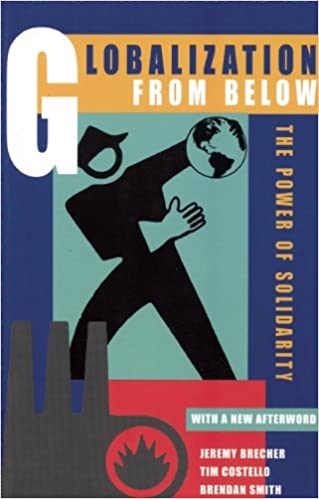
Globalization from Below, Jeremy Brecher. Get the book.
Globalization-from-below, in contrast, consisted of “an array of transnational social forces animated by environmental concerns, human rights, hostility to patriarchy, and a vision of human community based on the unity of diverse cultures seeking an end to poverty, oppression, humiliation, and collective violence.” It inclined not toward a New World Order but toward a “one-world community.” It was an expression of “the spirit of ‘democracy without frontiers’,” based in global civil society, which sought to “extend ideas of moral, legal, and environmental accountability to those now acting on behalf of state, market, and media.” During the 1980s, according to Falk, “transnational activism” by the environmental, human rights, and women’s movements became “prominent for the first time in history.” This “grassroots surge” featured “a shared conviction that upholding human rights and building political democracy” provided the common underpinning for desirable transnational change.[13] Presenting varied voices from this “surge,” Global Visions aimed to be a “multifesto” for globalization-from-below.
Meanwhile, George H.W. Bush’s vision of a consortium of powerful political regimes, corporations, and military establishments that would cooperate to impose a “New World Order” dissolved in the face of strains and conflicts among the partners in the aftermath of the first Gulf War. It was superseded by a vision of economic globalization which would essentially allow business enterprises to go wherever they wished and do whatever they wanted without any interference from governmental or popular organizations. After I published an article in The Nation describing economic globalization and the first glimmers of resistance to it, I received a note from Richard Falk, who I didn’t know, asking whether it wasn’t time for me to write a book about economic globalization and the resistance to it. The result in 1994 was a book called Global Village or Global Pillage: Economic Reconstruction from the Bottom Up.[14] What came to be called the “anti-globalization” or “global justice” movement, aka “globalization-from-below,” burgeoned, reaching a peak in the 1999 “Battle of Seattle” that halted the first meeting of the World Trade Organization; the next year I published Globalization from Below: The Power of Solidarity, tracing the growth of the movement and continuing to expand on Falk’s original notion of globalization-from-below.[15]
One aspect of globalization-from-below was an expanded commitment to making national governments accountable both to their own people and to an international law that required humane and democratic behavior. As Richard Falk wrote, the 1990s saw “a dramatic revival of the idea that neither states nor their leaders were above the law with respect to war making and crimes against humanity.” International tribunals tried war crimes in the former Yugoslavia, Rwanda, and Sierra Leone. The international Criminal Court was created – despite massive opposition from the Bush administration. Henry Kissinger – himself a target of that revival – wrote in alarm in 2001 that “in less than a decade an unprecedented movement has emerged to submit international politics to judicial procedures” and has “spread with extraordinary speed.”[16]
As the US prepared to invade Iraq, fifteen million people around the world demonstrated against the attack, in part because of its violation of international law. In the words of UN Secretary-General Kofi Annan, from the point of view of the UN Charter “it was illegal.” But the attack went ahead anyway. The illegality of the initial attack was followed by an illegal occupation and an open use and legitimation of torture. With two friends I edited a book called In the Name of Democracy: American War Crimes in Iraq and Beyond; Falk’s earlier writings on the Vietnam war were our Bible.
But during the Iraq war Richard Falk proved to be not just a figure from the past; he was again at the forefront of applying international law and the Nuremberg precedents to US war crimes. He wrote in our book,
There is little doubt that the Iraq War qualifies as an aggressive war that constitutes a crime against peace. As such, those who planned and executed this war should be subject to indictment and prosecution. Other crimes associated with the conduct of the war and the subsequent occupation should also give rise to accountability by reference to the laws of war and international humanitarian law.[17]
In 2005 Falk delivered the opening remarks at the culminating session of the World Tribunal on Iraq, one of fifteen civil society Tribunals held around the world.
Climate Insurgency
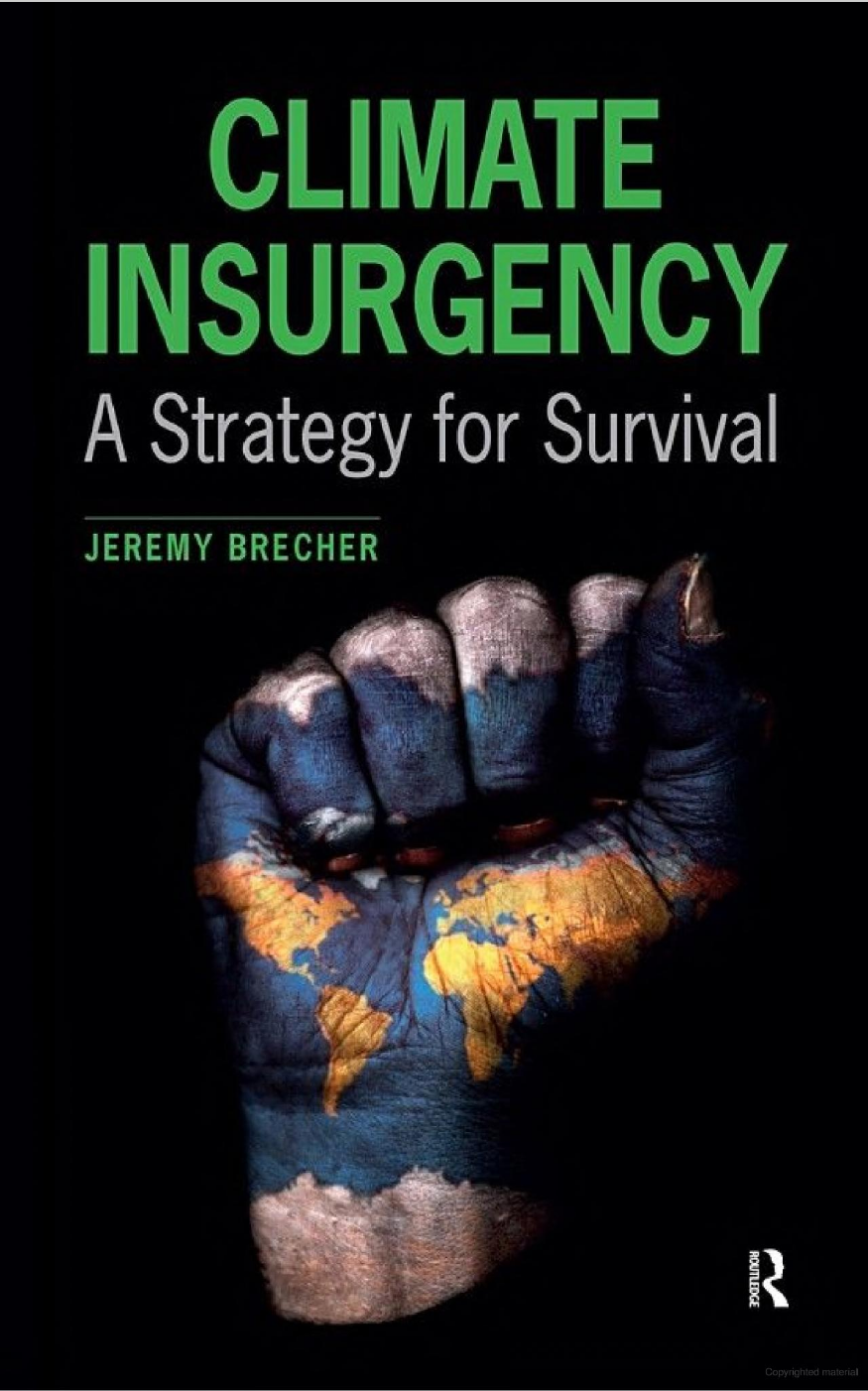
Climate Insurgency, A Strategy for Survival, Jeremy Brecher. Get the book.
In 2014, as the climate crisis became ever more pressing, I wrote a discussion paper that called for “Global Nonviolent Law-Enforcing Insurgency” designed to apply the lessons of the resistance movements against the Algerian, Vietnam, and Iraq wars to climate resistance. When I sent it to Richard Falk, he wrote back, “you must devote all your energies to putting this text into a book form.” The result was my book Climate Insurgency: A Strategy for Survival.[18] In it I quoted Falk’s explanation on the eve of the soon-to-fail Copenhagen climate summit that the inability of governments to cooperate to protect global public interests is compounded of “statism, neoliberal capitalism, hegemonic geopolitics, presentism, militarism, and nationalism.”[19] The world order was on its way to self-destruction.
I also wrote to Falk about the idea of a climate tribunal.
What about convening an equivalent to the Russell, Iraq, etc. civil society tribunals to listen to the argument and evidence for such a position and consider issuing a declaratory judgement and perhaps even “injunctions” that could be used to legitimate civil disobedience actions like those against the Keystone XL pipeline as citizens protecting their public trust?
Unbeknownst to me, Falk had long been alive to the dangers of environmental destruction; he had written a book as long ago as 1972 called This Endangered Planet: Prospects and Proposals for Human Survival. He wrote back that my proposed initiative would be “worthwhile if properly undertaken” although “requiring a great deal of effort.” He added that he was “glad to be supportive if I can be.”[20] That fall I worked with the Climate Justice Alliance to produce a Climate Justice Tribunal held across the street from the UN Climate Summit to indict political leaders and corporate polluters for their failure to protect our health, communities and planet.[21]
My two recent books, Save the Humans?: Common Preservation in Action and Common Preservation in a Time of Mutual Destruction, are devoted to the creation of a Human Survival Movement.[22] I regard them as an extended gloss on the work of Richard Falk.
On Not Seeing the Emperor’s New Clothes
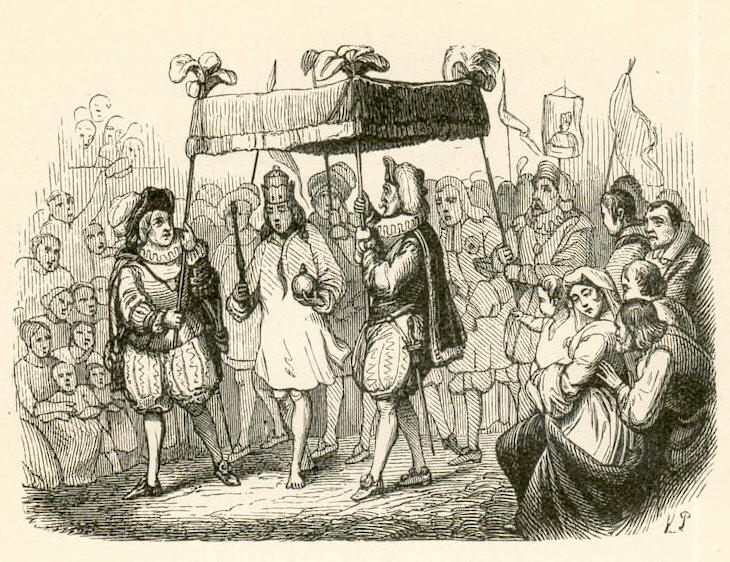
Ilustration of “The Emperor’s New Clothes.” Photo: Vilhelm Pedersen (1820 – 1859), Public Domain, Wikimedia Commons
Reading Citizen Pilgrim, I finally came to understand what made Falk different from your average chaired professor of international law. It might be described as an inability to see what others saw – an inability to share in the moral hypocrisy and double standards that make the status quo seem inescapable and acceptable.
During the Vietnam war, Falk was unable to see the difference between war crimes committed by the Nazis and those committed by the US. As UN Special Rapporteur on human rights in Palestine he was unable to discern the difference between the Israeli occupation and the South African apartheid to which he compared it. And he just didn’t understand that the citizens of a country bombing or starving the people of another country had an obligation to support the crimes of their own government rather than the rights of the victims.
Falk’s obtuseness was apparent in other realms as well. He couldn’t see that change that went beyond the imagination (or the interests) of those in power was simply not worth considering. He was oblivious in particular to the impossibility of changes to the world order that might go beyond the limits of the nation-state system.
Falk also failed to grasp the inherent legitimacy of those in power. He couldn’t see that policies and practices that were leading to ecocide and omnicide were justified as long as they were convenient in the short run for those who benefited from them. He couldn’t understand why governments and corporations that themselves would be destroyed by nuclear war or climate change should nonetheless indulge them if fixing them would undermine their short-term power and profit.
Falk suffered from a peculiar obstruction of moral vision. He was unable to understand why it was ok for one part of humanity to go hungry, suffer from treatable diseases, die young, and face police, paramilitary, and military repression when they tried to do something about it.
Underlying it all was a political obtuseness. He was unable to see that those with power had a right to exercise their power on those without it, even if their means were force, fraud, and torture.
Like the young child who couldn’t see the emperor’s new clothes, Richard Falk’s inability to perceive the delusions self-evident to others is the clearest vision.
[1] Richard Falk, Public Intellectual: The Life of a Citizen Pilgrim. (Atlanta: Clarity Press, 2021).
[2] “UN Envoy: Gaza Op Seems to Be War Crime of Greatest Magnitude,” Haaretz, March 19, 2009. https://www.haaretz.com/1.5090871
[3] “Declaration on the Right to Insubordination in the War in Algeria (The Manifesto of the 121)” https://www.marxists.org/history/france/algerian-war/1960/manifesto-121.htm
[4] “A Call to Resist Illegitimate Authority,” 1967. https://web.viu.ca/davies/H323Vietnam/Call.ResistAuthority.1967.htm
[5] Richard Falk, Gabriel Kolko, and Robert J. Lifton, eds., Crimes of War (New York: Random House, 1971).
[6] Richard Falk, The Promise of World Order: Essays in Normative International Relations. (Philadelphia, Temple UP, 1988).
[7] See my review, Jeremy Brecher, “World Government,” Z Magazine, June 1988. https://www.jeremybrecher.org/world-government/
[8] Falk, Citizen Pilgrim. p.394.
[9] Ibid, p.392.
[10] Document: New world order: George Bush’s speech, 6 Mar 1991″. Al-bab.com. Archived from the original on 31 May 2011.
[11] Jeremy Brecher, John Brown Childs, and Jill Cutler, eds., Global Visions: Beyond the New World Order. (Boston: South End Press, 1993.)
[12] Richard Falk, Predatory Globalization: A Critique (Boston, Polity, 1999), p. xi.
[13] Global Visions, p. xv.
[14] Jeremy Brecher and Tim Costello, Global Village or Global Pillage: Economic Reconstruction from the Bottom Up. (Boston: South End Press, 1994).
[15] Jeremy Brecher, Tim Costello, and Brendan Smith, Globalization from Below: The Power of Solidarity. (Cambridge, MA: South End Press, 2002).
[16]Kissinger, Henry (2001). The Pitfalls of Universal Jurisdiction. In Driscoll, W, Zompetti, J.P & Zompetti, S. (Eds.), The International Criminal Court: Global Politics and the Quest for Justice (pp. 93 – 101). International Debate Education Association (IDEA), 2004. https://www.worldcat.org/title/international-criminal-court-global-politics-and-the-quest-for-justice/oclc/493004116?referer=di&ht=edition
[17] Jeremy Brecher, Jill Cutler, and Brendan Smith, In the Name of Democracy: American War Crimes in Iraq and Beyond. (New York: Metropolitan Books, 2005), p. 306.
[18] Jeremy Brecher, Climate Insurgency: A Strategy for Survival. (Boulder, CO: Paradigm Publishers, 2015).
[19] Brecher, Ibid, p. 63.
[20] Personal communication, July 13, 2013.
[21] For an account of the tribunal see https://wagingnonviolence.org/2014/10/climate-destruction-court-public-opinion/
[22] Jeremy Brecher, Save the Humans? Common Preservation in Action (Oakland, CA: PM Press, 2020); Jeremy Brecher, Common Preservation in a Time of Mutual Destruction (Oakland, CA, PM Press, 2021).

